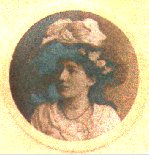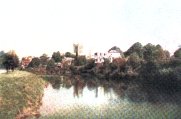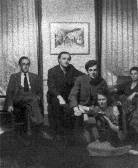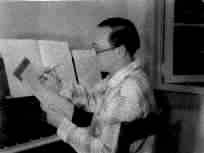born 14 April 1916 - died 27 May 2004.
(Editor's note: this biography was sent to me by Denis and
is unattributed. I reproduce it exactly)

DENIS ApIVOR was born in the Republic of Eire in 1916, during the
April Revolution;and spent most of the first five years of his life
in an old country rectory, close to the Shannon, returning to his
native Wales during the Civil War of 1921.
 His
mother trained as a Montessori teacher in London, and his father worked
at one time at Somerset House; but later trained for the priesthood
in Wales. His father was postmaster and a J.P. in the little mining
village of Corris Machylleth. ApIvor's grandfather on his mother's
side was a land-agent to Lord Boston in Llangtefni, the Anglesey county
town; and his grandmother was connected, way back to the 16th century,with
an East-Anglian family called Sculthorpe; and her brother, Canon James
Sculthorpe Lewis of St Asaph, had been educated at Christ
Church, Oxford.
His
mother trained as a Montessori teacher in London, and his father worked
at one time at Somerset House; but later trained for the priesthood
in Wales. His father was postmaster and a J.P. in the little mining
village of Corris Machylleth. ApIvor's grandfather on his mother's
side was a land-agent to Lord Boston in Llangtefni, the Anglesey county
town; and his grandmother was connected, way back to the 16th century,with
an East-Anglian family called Sculthorpe; and her brother, Canon James
Sculthorpe Lewis of St Asaph, had been educated at Christ
Church, Oxford.
It was to fulfil an ambition to follow in her brother's
foosteps that his grandmother organised the entry in 1925 of the young
Denis, who was already a chorister in the local choir, to the choir
at Christ Church Oxford, where he went from the family home in Caernarvon,
romantically situated on the Menai Straits; there his father
was, by now, a classics-master at the local High School. An excellent
musical education at the Cathedral and school launched him early-on
his career as a composer, at the age of 10 years, as he was already
showing small pieces to his music master. Henry Ley, master of choristers,
was soon replaced by Noel Ponsonby, father of the BBC Controller,
Robert Ponsonby, at whose christening ceremony ApIvor sang with the
rest of the choir. Noel Ponsonby, an enthusiast for the music of the
renaissence and baroque periods, unfortunately died young. But by
that time ApIvor had transferred to the choir at Hereford Cathedral,
where his father was a chaplain and classics master, following an
attack of pneumonia in 1928. Clearly, precociously interested in those
early days in composers, he asked Holst for his autograph in Christ
Church quadrangle, and was rebuffed. Only in later years did he realise
that, a few yards away, the great song~writer and authority on early
Music, Peter Warlock was, with some regularity, working in the Library;
and he did not become conscious of his work, that meant so much to
him in later years until he met the beautiful and unusual set of carols
in the Oxford Book, issued under the editorship of Vaughan Williams,
in 1928.
 Hereford 1928-33
Hereford 1928-33
At Hereford ApIvor learned the clarinet, pianoforte
and organ, and played in local orchestras; before leaving school he
had composed some well-rounded songs for voice and pianoforte, which
disappeared until they turned up in the hands of Prof.Jean Paul Vinay,
the authority on Linguistics, who had been a close friend of the young
composer at University College London, and emigrated from France to
Canada) after the Second World War.
 In spite of his obvious musical talents, ApIvor's family refused
to countenance a musical education at one of the Conservatoires, and
he entered University College, and later the hospital on a medical
course, in 1934. He played the clarinet in the College orchestra as
he had done earlier in the Welsh College at Aberyswyth, under David
de Lloyd. The University College conductor, Dr Thornton Lofthouse,
suggested composition lessons with his colleague, Herbert Howells;
but the meeting was not a success and made less so by ApIvor's unknowing
blunder in mentioning the name of one of Howells bête noire,
the composer van Dieren. Some months later, thanks to the good offices
of a Cambridge mathematician friend, with whom he shared a flat in
the curious Bloomsbury 'quarter' of Marchmont St., ApIvor became aquainted
with the composer and critic Cecil Gray, whose biography of the tragic
Peter Warlock he already admired.
In spite of his obvious musical talents, ApIvor's family refused
to countenance a musical education at one of the Conservatoires, and
he entered University College, and later the hospital on a medical
course, in 1934. He played the clarinet in the College orchestra as
he had done earlier in the Welsh College at Aberyswyth, under David
de Lloyd. The University College conductor, Dr Thornton Lofthouse,
suggested composition lessons with his colleague, Herbert Howells;
but the meeting was not a success and made less so by ApIvor's unknowing
blunder in mentioning the name of one of Howells bête noire,
the composer van Dieren. Some months later, thanks to the good offices
of a Cambridge mathematician friend, with whom he shared a flat in
the curious Bloomsbury 'quarter' of Marchmont St., ApIvor became aquainted
with the composer and critic Cecil Gray, whose biography of the tragic
Peter Warlock he already admired.
Following the death of Warlock in a mysterious gas-poisoning
incident in a Chelsea flat, ApIvor had already, as a young lad of
15, played the clarinet part in a performance by the Hereford orchestra
of the Capriol Suite of Warlock,given in memory of the composer.
With Gray's help ApIvor became a pupil of Patrick Hadley, later Professor
at Cambridge;and subsequently worked with Alan Rawsthorne, then at
the beginning of a career as an important new figure in the contemporary
music of the 1930s.

Student Days
L to R: Denis, William Bell, Poet Robert Walker and Janet
University College London 1936
Denis Apivor's studies with Rawsthorne,and friendship
with Gray, led indirectly to close contact with Constant Lambert,
then director of Sadlers Wells ballet, and composer of the brilliant
jazz-inspired Rio Grande. This work ApIvor already admired;as he did
the unique work Music Ho! linking contemporary art forms' in
a way which has seldom been equalled. By the time the débâcle
of 1939 had brought ApIvor's studies with Rawsthorne to a premature
end, ApIvor had already composed the work The Hollow Men for
baritone, Chorus and Orchestra, a setting of the doom-laden T.S Eliot
poem, which caused a considerable stir when first performed, under
Constant Lambert, in 1950.
Meanwhile the end of 1939 saw the composer already
installed in London hospitals as a war doctor, a year or so later
involved in casualty treatment in Hitler's 'blitzkrieg' on London.
At the Hospital of St John and St Elisabeth in St John's Wood, as
a transfusion officer, he had time to make contact with Frida Kindler,
Busoni pupil and van Dieren's widow, over a transcription he was making
of the 5th string quartet. But more importantly, through contact with
E.J.Dent, he had embarked on a large-scale arrangement for full orchestra
of Busoni's two-piano version of the Fantasia Contrappuntistica,
which was launched much later, by the BBC Orchestra, under Clarence
Raybould, in I952. The interest in Busoni was due to another
influence and friendship which did not reach maturity until the immediate
post-war years. While still in Aberystwyth, as a student, in the early
thirties the broadcast, organised by Edward Clark, of Berg's emotionally
riveting and epoch-making masterpiece Wozzeck, had introduced
a new dimension into the composer's life,which was to have a profound
effect. However, in the years just before the war, Clark also produced
a concert version of Busoni's Arlecchino, which ApIvor attended
with his teacher Rawsthorne, at Broadcasting House; and followed this
up with the monumental score of Doktor Faustus in concert performance,
which was not to be staged until the 1980s in London.
 Colleages at Jhansi British General Hospital, 1943
Colleages at Jhansi British General Hospital, 1943
Following war-service in hospitals in India, ApIvor
returned to London in 1945 and resumed contact with his musical friends.While
still in uniform he had completed a Concertante for Clarinet,
pianoforte and two percussion players. In Port Said harbour, on a
troopship, he composed the song Sospira cuor to words of the
maverick writer Rolfe, Baron Corvo. Later, while in camps on the South
Coast he began composition of one of his more successful song cycles,
to words of Federico Garcia Lorca . The composers enthusiasm for Lorca's
poetry dated back to the tragic murder of Lorca in 1936, and the subsequent,
somewhat corrupt, bilingual text edited by Spender and Gigli, in 1939.
ApIvor was fortunate in his introduction to Spanish song by the vihuela
player, Diana Poulton, who performed the works with her husband, Tom,
at Heyshot; and also introduced ApIvor to the Cante Jondo records,
somewhat rare at the time
Diana Poulton, later president of the Lute Society,
had been influenced in her choice of instrument by Peter Warlock.
She, together with Cecil Gray, Frida van Dieren, A.Hyatt King and
Alan Rawsthorne attended the first performance of the Lorca Songs
at St Martin's School of Art, Charing Cross Road, by the fine
lyric-baritone Frederick Fuller in 1946. In 1947 Edward Clark featured
them in a concert of the London branch of the ISCM at Wigmore Hall,by
the same singer. The composer himself conducted the first BBC performance
of the Clarinet Concertante in 1948.
Two years later, as was mentioned above, Constant
Lambert scored a success with the first performance of The Hollow
Men at Broadcasting House, and the work was published by the Oxford
Press in 1951. In that year the composer was, with one or two other
friends, helping the ailing Lambert to complete his score of the ballet,
Tiresias. Launched in the late summer at Covent Garden, with
Fonteyn in the principal female role, the ballet awoke a storm of
criticism against Lambert, and with unnecessary vindictiveness against
his directorship of the musical side of the ballet company, which
has in fact never been equalled .
| The strain with his poor health, due to drinking. was too much
for him and he died suddenly in the early autumn, but having recommended
ApIvor to the choreographer Andrée Howard, for a tragic
ballet on the subject of the Salem Delusion Witch-burnings.
The ballet, A Mirror for Witches, which
was produced in 1952, was one of a small group of 'strong',
dramatic works, which appeared at that time,and included the
Don Quijote of Roberto Gerhard, and Lambert's own Tiresias.
.The Apivor work launched him on a career of ballet which
lasted into the 1960's and beyond. Of these the most successful,
with choreography by Alfred Rodrigues, was another Lorca work,
Blood Wedding, based on Bodas de Sangre,a tale of Andalucian
vengeance and violence. The ballet went on to be performed in
every continent, including North and South America, in Capetown,
various Australian Cities, and even in Franco's Spain, where
there was some dangerous reaction to the re-emergence of stage-work
by the still-unforgiven poet
|

First Night of "A Mirror For Witches"
Anne Heaton, Scenery desgner Norman Adams and the composer (left)
(1952)
|
The direct result of the success of Blood Wedding
was a commission by the Sadlers Wells Opera Trust to the composer,
to compose an opera; at a time when such commissions were few and
far between.The composer was somewhat opposed to using the other dramatic
works of Lorca; but the management was insistent. They were not so
insistent on using Britten's one-time librettist, Montagu Slater;
indeed may have secretly dissaproved, as Slater was a known left-winger.
ApIvor, once told of the Trusts choice, threw himself enthusiastically
into the work, in the Carribean island of Trinidad, where he had taken
a part-time post~to keep him during the composition of the music,
which however proved exhausting, and he was taken seriously ill with
gastric trouble, which never really left him thereafter. Back in England
he  completed
the orchestration of Yerma in the Suffolk countryside in a
small cottage near Sudbury.
completed
the orchestration of Yerma in the Suffolk countryside in a
small cottage near Sudbury.
Composing/orchestrating
Yerma Trinidad 1956 (age 39)
In the interim period another large Lorca work, this
time the choral and orchestral Tamar and Amnon from Lorca's
poem of the Cante Jondo had been launched by Eugene Goossens,
under the auspices of the Institute of Contemporary Arts. In 1958
the BBC in Scotland gave the first performance of the Concertino for
guitar and orchestra, written for the young Julian Bream, probably
the first British concerto written for the rising international virtuoso
of the instrument (op 26 1954). Bream expressed himself enthusiastic
about the work and later commissioned a group of Variations for
solo guitar,; but then refused to play them, on the grounds of their
serial constitution. But prior to this work in 1959 there had been
a sudden turn-around in the attitude of the hitherto friendly Sadlers
Wells Theatre Trust, who rejected their commission and refused to
stage the opera, now completed in full score. This event, and some
musical, semi-political 'bad behaviour' dating from 1955, led the
composer to withdraw from all musical social and political contacts.
Two works were performed in the Promenade Concerts, thanks to the
interest of the, then BBC Controller, Richard Howgill. [A
Mirror for Witches, concert suite; op19a,1954. Concerto
for Pianoforte and Orchestra, op13,1958.] The composer withdrew
from London and set himself up in a part time medical post in Kent
and after a year of Jungian analysis began the early stages of a thirty
year period in isolation, composing a series of works, including two
subsequent operas in three or four acts to his own libretti.
Miraculously, under the influence of Edward Clark,
one time president of the ISCM, Richard Howgill and subsequently Sir
William Glock, conspired to obtain a full-scale, recorded concert-performance
on two separate dates in 1960 and 1961, of the abandoned opera YERMA,under
the ageing Goossens -who was himself the composer of an earlier opera
on a Spanish theme.
In 1967 the Pollitzer Trust provided a retrospective
concert of the composer'ssongs and chamber works at the Wigmore Hall
London, which included the new Firsts String Quartet; The T.S
Eliot Landscapes (op15 1950), and a new chamber piece, Crystals
for amplified-guitar, marimband Hammond-Organ, contrabass, and
2 further percussion parts. Since 1960 the composer had been moving
in a more radical direction, and largely deploying the serial techniques
of the so-called"post-Webern" movement; but such well integrated and
difficult works as the Dylan Thomas Cantata, (based on the
Altarwise by owl light sonnets), failed to get the performance
they demanded. In this highly prolific period the composer completed
a number of individual guitar pieces. The Concertino and Variations
were published by Schotts and some small pieces, later, by Berbens
of Ancona, including a version of the Lorca Song group, with
guitar accompaniment, with the old, regrettably inaccurate Spender-Gigli
text; and some other mistakes. The correct text from Aguilar (Madrid)
was not restored until the composers Lorca translations emerged during
the 1980s. That text, in Ms in spite of strenuous attempts to obtain
interest, remains in manuscript; and copies of the seven volumes were
distributed among Hispanic authorites in England and the United States;
including, Trader Faulkner and Alison Sinclair in Britain , and Prof
Roger Tinnell,of the University of New Hampshire5, in the U.S.A. In
1966 the composer who had determined never again to seek operatic
commissions- embarked on two works from the Theatre of the "absurd":Jarry's
famous UBU ROI (three acts), and a four-act work based on Flaubert's
ludicrous pair, Bouvard and Pécuchet, a work suggested by Cecil
Gray,and "mulled over" for thirty years. After the war the composer's
firt opera, a Buffa work, inspired by van Dieren's enthusiasm for
Donizetti,on Goldmit's She Stoops to Conquer was completed,
stimulated by the Festival of Britain's 'commissions' of bad fame.
In all these works the composer was determinedly his own librettist,
a course of conduct approved by the great E.T.A Hoffman [Musician
and Poet (1776-1822)], and perhaps helped by Apivor's personal
involvment at the time in writing some original verse, and extensive
translation.
In the ballet Veneziana of 1953 (Royal Ballet)
with Sophie Fedorovitch's beautiful decor, ApIvor had used a body
of Donizetti's music, on which to base the score, much as did Stravinsky
in Pulcinella [music by Pergolesi]. In 1968
the BBC Television commissioned a work, Corporal Jan, choreographed
by Sir Peter Wright; a highly interesting piece, again on the theme
of the supernatural, as in Mirror for Witches, but with echoes
of the mythological saga of the sacrificed hero; but the work was
spoiled for posterity by the BBC's lack of foresight in refusing to
pay, at that time, for colour-film stock, and in a certain mean-ness
in the treatment of rehearsal time. A single, later ballet came from
the composer's pen a decade later, for the small Cedars Company, with
Arts Council Funds. But in spite of a good recording tape,the work
never materialised adequately on stage . The composer's title Glide
the Dark door wide, came from a Dylan Thomas poem; but the ballet
dealt with a fascinating Sumerian fertility-myth of the 'harrowing
of hell', of some four to five thousand years old.

The composer in 1970
During the thirty year period described above, and
before, the composer had found time to produce a series of classical
non-theatre works : Three string quartets: five Symphonies; approximately
eighty songs,(many in Song Cycle concentrating on major poets (Chaucer,
Elizabethian, Dowson, Lovell Beddoes, T.S Eliot, Garcia Lorca), and
having alternative instrumental accompaniments; and the body of Concerti:
The Clarinet Concertante,with its orchestral alternative; The
Fantasy Concertante for Horn and Orchestra; The Triple concerto
for string trio and string orchestra (String Abstract) and the Piano
concerto op 13; the two violin works; one with 15 instruments
and one with full orchestra (op 61 I975) and the cello concerto
op64; which, like the horn work, was premiered in the 1980s with Frank
Lloyd and Raphael Walfisch, respectively. The piano concerto was heard
at a promenade concert, with soloist Patrick Piggot, in 195; and the
early Violin concerto and 15 instruments appeared at an ICA
concert at Maida Vale studios,. (BBC) featuring the New Zealand player,
Alan Loveday. The triple String concerto respresents ApIvor's
only Cheltenham Festival Commission (1968).











